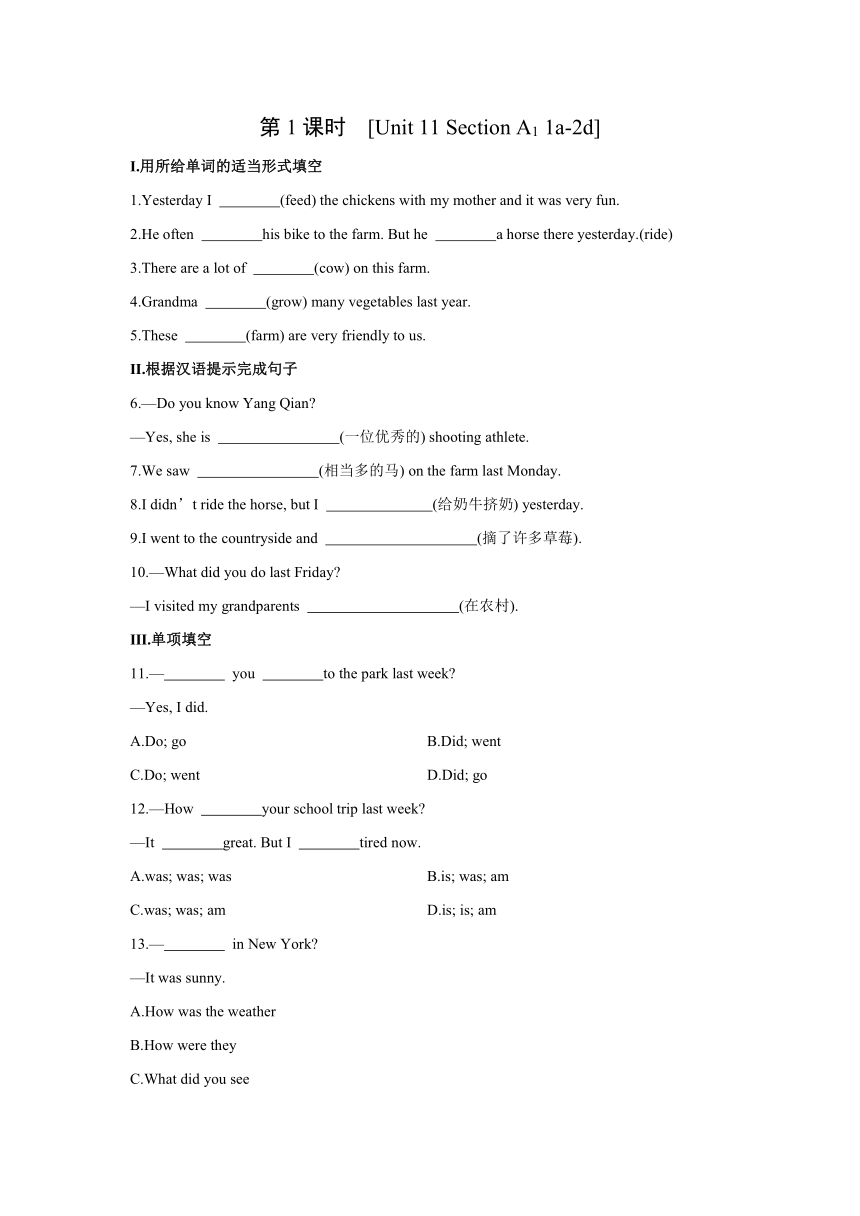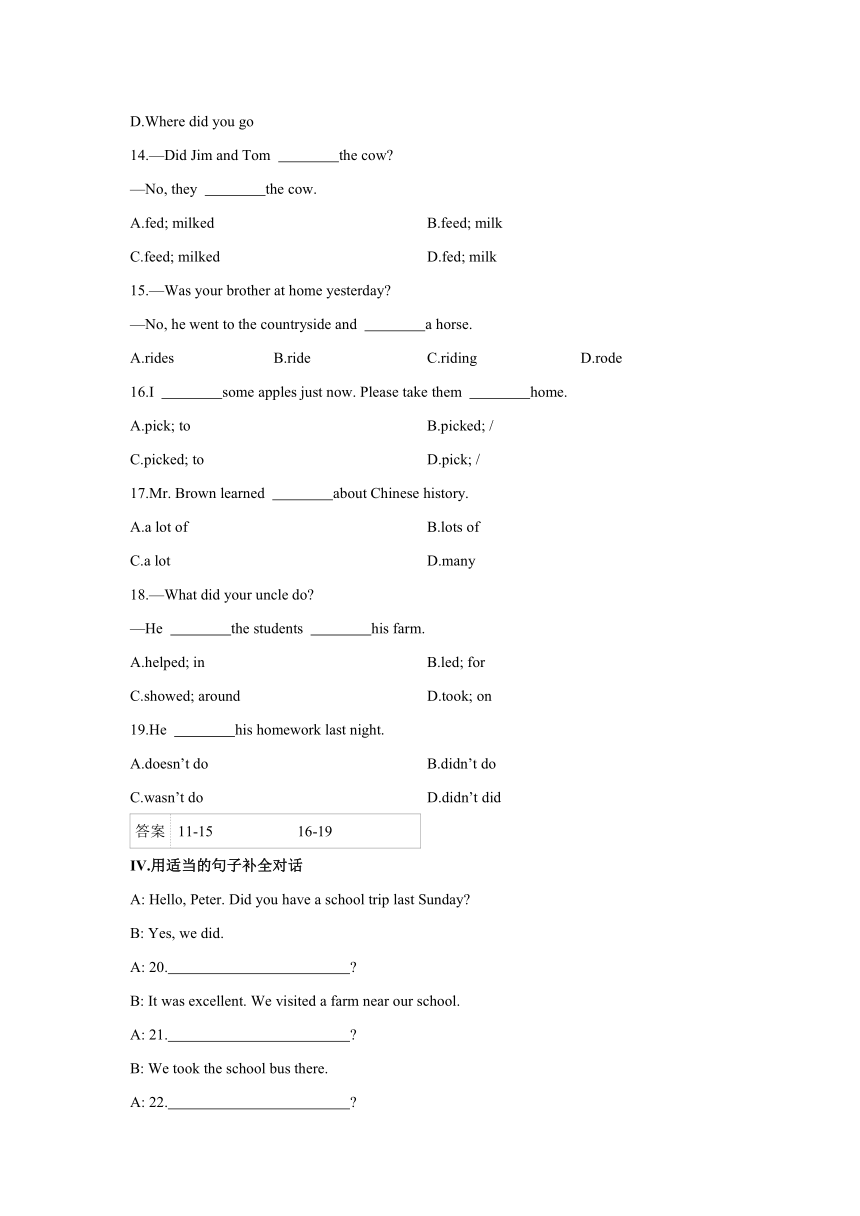人教版英语七年级下册Unit 11 How was your school tripSection A1 1a-2d课课练(含答案)
文档属性
| 名称 | 人教版英语七年级下册Unit 11 How was your school tripSection A1 1a-2d课课练(含答案) |

|
|
| 格式 | docx | ||
| 文件大小 | 42.6KB | ||
| 资源类型 | 教案 | ||
| 版本资源 | 人教新目标(Go for it)版 | ||
| 科目 | 英语 | ||
| 更新时间 | 2022-07-13 00:00:00 | ||
图片预览


文档简介
第1课时 [Unit 11 Section A1 1a-2d]
Ⅰ.用所给单词的适当形式填空
1.Yesterday I (feed) the chickens with my mother and it was very fun.
2.He often his bike to the farm. But he a horse there yesterday.(ride)
3.There are a lot of (cow) on this farm.
4.Grandma (grow) many vegetables last year.
5.These (farm) are very friendly to us.
Ⅱ.根据汉语提示完成句子
6.—Do you know Yang Qian
—Yes, she is (一位优秀的) shooting athlete.
7.We saw (相当多的马) on the farm last Monday.
8.I didn’t ride the horse, but I (给奶牛挤奶) yesterday.
9.I went to the countryside and (摘了许多草莓).
10.—What did you do last Friday
—I visited my grandparents (在农村).
Ⅲ.单项填空
11.— you to the park last week
—Yes, I did.
A.Do; go B.Did; went
C.Do; went D.Did; go
12.—How your school trip last week
—It great. But I tired now.
A.was; was; was B.is; was; am
C.was; was; am D.is; is; am
13.— in New York
—It was sunny.
A.How was the weather
B.How were they
C.What did you see
D.Where did you go
14.—Did Jim and Tom the cow
—No, they the cow.
A.fed; milked B.feed; milk
C.feed; milked D.fed; milk
15.—Was your brother at home yesterday
—No, he went to the countryside and a horse.
A.rides B.ride C.riding D.rode
16.I some apples just now. Please take them home.
A.pick; to B.picked; /
C.picked; to D.pick; /
17.Mr. Brown learned about Chinese history.
A.a lot of B.lots of
C.a lot D.many
18.—What did your uncle do
—He the students his farm.
A.helped; in B.led; for
C.showed; around D.took; on
19.He his homework last night.
A.doesn’t do B.didn’t do
C.wasn’t do D.didn’t did
答案 11-15 16-19
Ⅳ.用适当的句子补全对话
A: Hello, Peter. Did you have a school trip last Sunday
B: Yes, we did.
A: 20.
B: It was excellent. We visited a farm near our school.
A: 21.
B: We took the school bus there.
A: 22.
B: We picked strawberries and apples. We also watered flowers.
A: 23.
B: Yes. We had a great time. Did you have a school trip
A: 24. . But we’ll have one next month.
Ⅴ.阅读理解
Mr. Green made a robot, but he could only say one sentence. That is “You are quite right.” The robot always repeated the same words when someone spoke to him.
One day, Mr. Green needed lots of money, so he took the robot to the market to sell him.
“Who will buy my robot He is very smart,” he shouted(喊叫). “Nine hundred dollars for my robot!”
A man was surprised(惊讶的) that he was asking for so much money. “Is it different ” he thought.
Then he spoke to the robot, “Are you worth(值……钱) nine hundred dollars ”
“You are quite right,” answered the robot.
The man liked the robot’s answer so much, and he bought him and took him home. But soon he found that the robot couldn’t say anything else. He was sorry he bought the robot. He stood(站立) in front of the robot and said, “How foolish(愚蠢的) I was to spend so much money on you!”
“You are quite right,” said the robot.
25. The underlined word “repeated” means “ ” in Chinese.
A.重复 B.讲解
C.组合 D.选择
26. Why did Mr. Green sell the robot
A.Because the robot didn’t work.
B.Because Mr. Green didn’t like it.
C.Because Mr. Green needed money.
D.Because the robot was too old.
27. When the man heard Mr. Green’s words at the market, he thought .
A.the robot was special
B.Mr. Green was kind
C.the robot was cheap
D.Mr. Green didn’t want to sell the robot
28. We can learn that the man was sorry for .
A.meeting Mr. Green
B.going to the market
C.talking to the robot
D.buying the robot
29. The best title for this passage is “ ”.
A.A Foolish Man
B.The Only Answer
C.A “Special” Robot
D.A Right Sentence
答案 25-29
答案
Unit 11 Section A1 1a-2d
Ⅰ.1.fed 2.rides; rode 3.cows
4.grew 5.farmers
Ⅱ.6.an excellent 7.quite a lot of horses
8.milked the cow(s)
9.picked lots of strawberries
10.in the countryside
Ⅲ.11.D
12.C 根据“last week”和“now”可以判断谈论的是过去的学校旅游,但表达了现在的感受,所以前两个空用一般过去时,最后一个空用一般现在时。
13.A 由答句可知,上句询问天气,且为一般过去时。故选A。
14.C
15.D 这里and连接两个并列的动词短语,went to the countryside是一般过去时,故and后面的动词短语也要用一般过去时。
16.B just now是一般过去时的标志词语,所以第一空用picked; take…to…意为“把……带到……”,home为地点副词,要省略to。故选B。
17.C
18.C 根据语境可以判断,他带着学生们参观了他的农场。show…around…意为“带领……参观……”。
19.B
Ⅳ.20.How was your school trip
21.How did you get/go there
22.What did you do there
23.Did you have fun/have a good time (on the farm)
24.No, we didn’t
Ⅴ.25—29 ACADC
Ⅰ.用所给单词的适当形式填空
1.Yesterday I (feed) the chickens with my mother and it was very fun.
2.He often his bike to the farm. But he a horse there yesterday.(ride)
3.There are a lot of (cow) on this farm.
4.Grandma (grow) many vegetables last year.
5.These (farm) are very friendly to us.
Ⅱ.根据汉语提示完成句子
6.—Do you know Yang Qian
—Yes, she is (一位优秀的) shooting athlete.
7.We saw (相当多的马) on the farm last Monday.
8.I didn’t ride the horse, but I (给奶牛挤奶) yesterday.
9.I went to the countryside and (摘了许多草莓).
10.—What did you do last Friday
—I visited my grandparents (在农村).
Ⅲ.单项填空
11.— you to the park last week
—Yes, I did.
A.Do; go B.Did; went
C.Do; went D.Did; go
12.—How your school trip last week
—It great. But I tired now.
A.was; was; was B.is; was; am
C.was; was; am D.is; is; am
13.— in New York
—It was sunny.
A.How was the weather
B.How were they
C.What did you see
D.Where did you go
14.—Did Jim and Tom the cow
—No, they the cow.
A.fed; milked B.feed; milk
C.feed; milked D.fed; milk
15.—Was your brother at home yesterday
—No, he went to the countryside and a horse.
A.rides B.ride C.riding D.rode
16.I some apples just now. Please take them home.
A.pick; to B.picked; /
C.picked; to D.pick; /
17.Mr. Brown learned about Chinese history.
A.a lot of B.lots of
C.a lot D.many
18.—What did your uncle do
—He the students his farm.
A.helped; in B.led; for
C.showed; around D.took; on
19.He his homework last night.
A.doesn’t do B.didn’t do
C.wasn’t do D.didn’t did
答案 11-15 16-19
Ⅳ.用适当的句子补全对话
A: Hello, Peter. Did you have a school trip last Sunday
B: Yes, we did.
A: 20.
B: It was excellent. We visited a farm near our school.
A: 21.
B: We took the school bus there.
A: 22.
B: We picked strawberries and apples. We also watered flowers.
A: 23.
B: Yes. We had a great time. Did you have a school trip
A: 24. . But we’ll have one next month.
Ⅴ.阅读理解
Mr. Green made a robot, but he could only say one sentence. That is “You are quite right.” The robot always repeated the same words when someone spoke to him.
One day, Mr. Green needed lots of money, so he took the robot to the market to sell him.
“Who will buy my robot He is very smart,” he shouted(喊叫). “Nine hundred dollars for my robot!”
A man was surprised(惊讶的) that he was asking for so much money. “Is it different ” he thought.
Then he spoke to the robot, “Are you worth(值……钱) nine hundred dollars ”
“You are quite right,” answered the robot.
The man liked the robot’s answer so much, and he bought him and took him home. But soon he found that the robot couldn’t say anything else. He was sorry he bought the robot. He stood(站立) in front of the robot and said, “How foolish(愚蠢的) I was to spend so much money on you!”
“You are quite right,” said the robot.
25. The underlined word “repeated” means “ ” in Chinese.
A.重复 B.讲解
C.组合 D.选择
26. Why did Mr. Green sell the robot
A.Because the robot didn’t work.
B.Because Mr. Green didn’t like it.
C.Because Mr. Green needed money.
D.Because the robot was too old.
27. When the man heard Mr. Green’s words at the market, he thought .
A.the robot was special
B.Mr. Green was kind
C.the robot was cheap
D.Mr. Green didn’t want to sell the robot
28. We can learn that the man was sorry for .
A.meeting Mr. Green
B.going to the market
C.talking to the robot
D.buying the robot
29. The best title for this passage is “ ”.
A.A Foolish Man
B.The Only Answer
C.A “Special” Robot
D.A Right Sentence
答案 25-29
答案
Unit 11 Section A1 1a-2d
Ⅰ.1.fed 2.rides; rode 3.cows
4.grew 5.farmers
Ⅱ.6.an excellent 7.quite a lot of horses
8.milked the cow(s)
9.picked lots of strawberries
10.in the countryside
Ⅲ.11.D
12.C 根据“last week”和“now”可以判断谈论的是过去的学校旅游,但表达了现在的感受,所以前两个空用一般过去时,最后一个空用一般现在时。
13.A 由答句可知,上句询问天气,且为一般过去时。故选A。
14.C
15.D 这里and连接两个并列的动词短语,went to the countryside是一般过去时,故and后面的动词短语也要用一般过去时。
16.B just now是一般过去时的标志词语,所以第一空用picked; take…to…意为“把……带到……”,home为地点副词,要省略to。故选B。
17.C
18.C 根据语境可以判断,他带着学生们参观了他的农场。show…around…意为“带领……参观……”。
19.B
Ⅳ.20.How was your school trip
21.How did you get/go there
22.What did you do there
23.Did you have fun/have a good time (on the farm)
24.No, we didn’t
Ⅴ.25—29 ACADC
同课章节目录
- Unit 1 Can you play the guitar?
- Section A
- Section B
- Unit 2 What time do you go to school?
- Section A
- Section B
- Unit 3 How do you get to school?
- Section A
- Section B
- Unit 4 Don't eat in class.
- Section A
- Section B
- Unit 5 Why do you like pandas?
- Section A
- Section B
- Unit 6 I'm watching TV.
- Section A
- Section B
- Review of Units 1-6
- Unit 7 It's raining!
- Section A
- Section B
- Unit 8 Is there a post office near here?
- Section A
- Section B
- Unit 9 What does he look like?
- Section A
- Section B
- Unit 10 I'd like some noodles.
- Section A
- Section B
- Unit 11 How was your school trip?
- Section A
- Section B
- Unit 12 What did you do last weekend?
- Section A
- Section B
